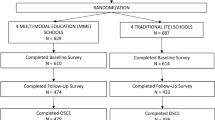In March 1991 the National Institutes of Health claimed surgery as a viable means of treatment for clinically severe obesity once other conventional methods had failed. Also stated in the same report was that postoperative care, nutritional counseling and surveillance should continue for an indefinitely long period. Many surgeons are choosing regular office examinations and group behavior modification sessions for this surveillance. This educational process often poses insurmountable challenges for the professional who chooses to follow the patients postoperatively. As the doctor continues to monitor vital signs and systems, the group facilitator must monitor the patient's emotional ups and downs, signs of low self-esteem, and evidences of self-defeating behavior. Considering this, the ultimate challenge is that those who teach must understand what needs to be taught. The educational process could be divided into three areas, including lessons of the mind, the body, and the ‘self.’ The group leader will not always find the material for these lessons in books. Many will be developed through heartfelt experiences, but the most important resource for information will be the patient.
Similar content being viewed by others
Author information
Authors and Affiliations
Rights and permissions
About this article
Cite this article
Smiertka, J.K. The Challenge of Teaching Behavior Modification. OBES SURG 4, 308–310 (1994). https://doi.org/10.1381/096089294765558584
Published:
Issue Date:
DOI: https://doi.org/10.1381/096089294765558584




